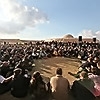About Sacrifices, Tithe And Unite The Nation
 The term “sacrifices” in Judaism refers to the desire to give of oneself to society. From the meat of the animals that were sacrificed at the Temple, the poor, the Levites, and the people held meals, and this was called “the work of the Temple.”
The term “sacrifices” in Judaism refers to the desire to give of oneself to society. From the meat of the animals that were sacrificed at the Temple, the poor, the Levites, and the people held meals, and this was called “the work of the Temple.”
The desire to give of oneself to society was expressed in the form of a commandment a person should perform, in the form of tithe, which was used for educating the people.
Everyone had to bring a sacrifice according to the sin he had committed or something that he did wrong. The people were on a spiritual level at that time, and everyone determined his egoistic sins by himself since the others didn’t see them. A person felt where he had gone wrong and where he had sinned, and then according to Rabash, he had to have a feast, invite friends, sit together, and connect with them. This is called “God’s work.”
This is how people connect. At the same time they did very intensive, internal, spiritual work as to why they were doing all that. When a person has a feast, he raises and awakens others so that they will impress him more next time and help him not to fall again.
Everything is done in a very peaceful way as we also do today. Why do we need a corporeal Temple? We have a place where we meet with the group and there you bring your “sacrifices.” But everyone has to first clarify things in an anti-egoistic manner since otherwise all this is meaningless.
The sacrifices, the work in the Temple, and all the other activities are totally different from what we were brought up to believe. It is all aimed only at the connection between people.
The Temple is a place where all the desires and all the corrections gather. It is the place from where people went out to every region to teach the people, and there wasn’t anyone who did not know how to read and how to count. Everyone knew how to do everything; they all knew the spiritual work thanks to the tithe they gave to support the Temple.
No one followed anyone! Everyone had to do this, otherwise you were not considered one who bestows, who gives. What’s more, if a person gave unwillingly and only because he was forced to, it wasn’t considered a tithe. As it says on the two tablets on which the Ten Commandments were engraved:”Everyone should give as his heart wills.” If it doesn’t come from the heart, it is not considered bestowal.
The Torah, “Exodus,” “Jethro,” 20:22: And if thou wilt make me an altar of stone, thou shalt not build it of hewn stone: for if thou lift up thy tool upon it, thou hast polluted it.
An altar must always be higher than you, above your head, “above reason,” above your knowledge and your attainment. This means that bestowal should always be higher than all your calculations.
[111351]
From KabTV’s “Secrets of the Eternal Book” 3/4/13
Related Material:
An Altar Made Of Desires
Charging The Air Of The Convention
The True Meaning Of Sacrifice







Discussion | Share Feedback | Ask a question